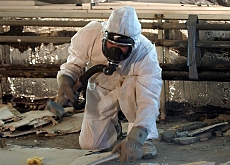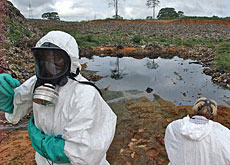Swiss industrialist faces trial over asbestos

A major trial opens in Italy on Thursday in which a Swiss industrialist is accused of co-responsibility for the deaths of hundreds of workers.
Stephan Schmidheiny, one of Switzerland’s richest men, and his fellow accused, the Belgian Jean Louis Marie Ghislaine De Cartier, were majority shareholders in the Italian Eternit Genova company, which owned four asbestos factories in Italy.
Thousands of people are expected to turn up for a demonstration outside Turin’s law courts as the trial opens.
Asbestos victims and their families have organised buses to take them to the city, many of them from the small town of Casale Monferrato in the northern Italian Piedmont region, home until 1986 to one of the factories belonging to Eternit.
In the past few decades some 1,400 people have died from the consequences of asbestos dust in this area alone. About 40 new cases are reported every year. And the story is not over yet: the latency period for the typical incubation period for mesothelioma, the cancer typically caused by asbestos, is 20-40 years.
The accused
The case submitted by state prosecutor Raffaele Guariniello is that Schmidheiny and Cartier knew of the dangers of asbestos but did not take the necessary measures to protect those coming into contact with it.
If found guilty, they could face up to 13 years in prison.
The Italian prime minister, Silvio Berlusconi, is also being summoned ex officio, since the Italian state is accused of exercising its duty of supervision.
The Italian insurance institution for occupational illnesses is acting as joint plaintiff. It is demanding damages of €246 million (SFr375 million).
Justice for the families
Having spent more than three months examining the case, the investigating magistrate Cristina Palmesino decided in July that the charges were admissible.
About 3,000 sufferers and their families are involved as a civil party in the trial, the biggest in the history of Italian justice. It is expected to last for two or three years.
“This is an incredibly important moment for the victims and their families,” said Zurich journalist Maria Roselli, whose 2007 book ‘Die Asbestlüge, Geschichte und Gegenwart einer Industriekatastrophe’ (The asbestos lie, the past and present of an industrial disaster) was the fruit of a detailed investigation into the production of this building material and its fatal consequences.
“Many of them gave up believing it would ever happen, so the mere fact that the trial is starting is seen as a small victory for justice,” she said – an opinion echoed by representatives of the victim help organisations.
Schmidheiny absent
Stephan Schmidheiny will not appear in court himself, his Italian lawyer Astolfo Di Amato said.
“The company invested 70 billion lire (SFr70 million) in safety between 1976 and 1986 and earned nothing. That can be seen clearly in the accounts,” Di Amato maintains. That means there is no question of there having been any speculation on the backs of the workers, he said.
Peter Schürmann, Schmidheiny’s spokesman in Switzerland, said he was never really an owner of the Italian Eternit works, nor did he have any operational role there.
“However incomprehensible this trial is from Mr Schmidheiny’s point of view, there is at least one good thing about it: it will clarify the responsibilities which form the basis for the charges being laid against him.”
Compensation
Schmidheiny has always maintained that the asbestos issue is a “social problem” and cannot always be solved on the basis of “individual responsibility”.
In the run-up to the trial the Swiss industrialist offered victims’ families compensation of €60,000 if they abandoned their civil action.
Given that trials in Italy can last for ever and their outcome is uncertain, many families accepted the offer. According to Di Amato 700 have done so, while Schürmann puts the figure at 1,500 people.
The trial is being observed closely by Swiss asbestos victims. For if the accused should be found guilty, Swiss victims could bring civil actions later, explained Massimo Aliotta of the Association of Asbestos Victims in Switzerland.
Some 200 cases are still pending which involve workers employed in the Swiss Eternit factories but who died in Italy. But under the statute of limitations, no criminal case about the asbestos issue can now be brought in Switzerland.
Switzerland’s highest court has made this clear. “Even if Stephan Schmidheiny were to be found guilty in Italy, time has run out for a trial in Switzerland,” Aliotta admitted.
Gerhard Lob, swissinfo.ch (adapted from German by Julia Slater)
More than 200,000 documents have been prepared for the Turin trial. They include details of the cases of thousands of people who have been victims of mesothelioma. In Casale alone 1,378 workers have died, in Cavagnolo 118, and in Bagnoli 384.
About 700 people in the area are currently living with the disease. Not only workers, but also members of their family members and people who lived in the neighbourhood and came into contact with the fibres are affected.
Asbestos is the name of a group of naturally occurring fibrous minerals. They are fire and acid resistant and have great tensile strength.
By the mid-20th century it was widely used in industry for its fire and heatproof qualities, in a broad range of applications including bricks, flooring and roofing, insulation and brake pads.
The first investigations into its impact on health were conducted in the 1940s. It was gradually realised that during processing minute fibres were released, which could seriously damage health if breathed in.
Even very small concentrations of asbestos dust could lead to lung cancer or to mesothelioma, a cancer in which malignant cells develop in the protective lining that covers most of the body’s internal organs.
The use of asbestos is banned in 40 countries. The ban has been in force in Switzerland since 1990, where the use of sprayed asbestos was stopped in the mid-70s.

In compliance with the JTI standards
More: SWI swissinfo.ch certified by the Journalism Trust Initiative












You can find an overview of ongoing debates with our journalists here . Please join us!
If you want to start a conversation about a topic raised in this article or want to report factual errors, email us at english@swissinfo.ch.